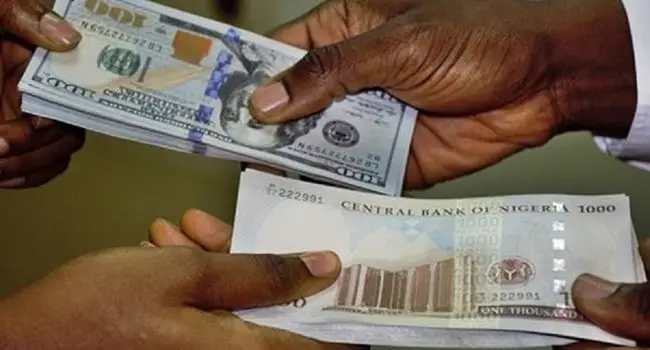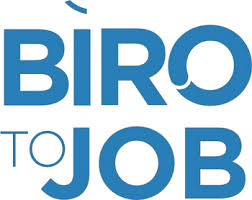Naira Appreciates As Forex Reserves Rises

The naira rallied to a recovery at the weekend on the back of sustained increase in the country’s foreign exchange (forex) reserves.
The naira appreciated by 1.0 per cent to N1, 482.81 per dollar at the Nigerian Autonomous Foreign Exchange Market (NAFEM).
This came as the nation’s forex reserves rose by additional $73.05 million to $32.74 billion. It was the fifth consecutive accretion in the continuing buildup of the reserves.
Penultimate week, the reserves had added $195.01 million. It had grown by $89.76 million, $132.68 million and $10.76 million in recent weeks.
At the forwards market, naira contracts closed on the upside at the weekend with the one-year contract appreciating by 1.1 per cent to $1,504.10 per dollar. The three-month contract recovered by 1.4 per cent to N1,546.65 per dollar while the six-month contract appreciated by 0.6 per cent to N1,621.89 per dollar. However, the one-year contract slipped by 0.1 per cent to N1,769.62 per dollar.
Finance and economy experts were unanimous that the buildup in external reserves was a good indication for the country’s currency management and macroeconomic stability.
Analysts expected that changes in forex management rules, steady improvement in crude oil production and upbeat in global oil price could help the country mitigate its volatile forex situation.
President, Association of Capital Market Academics in Nigeria, Prof Uche Uwaleke, said any increase places the CBN in a stronger position to meet forex obligations as well as intervene in the forex market.
“If this development is sustained, we are likely to witness an appreciation of the naira in the forex market and more stability in the exchange rate following improved liquidity. This is one positive development capable of keeping away destructive speculators from the forex market,” Uwaleke said.
Uwaleke however said Nigeria needs to curb excessive import dependence to support its forex recovery.
“It goes without saying that export-based diversification remains the oly sustainable solution to the present forex crisis,” Uwaleke said.
According to him, to curb the demand pressure, government should compel a change in consumption behaviour by enacting a ‘Buy Nigeria law’ akin to the ‘Buy America Act’ of 1933 and recently the ‘Build America, Buy America Act’ of 2021.
“Also, Nigeria’s import data support revisiting and scaling up the CBN’s currency swap deal with the Peoples Bank of China. Given that the bulk of Nigeria’s imports are from China, it stands to reason, therefore, to explore ways of bypassing the dollars and settling these transactions in the Yuan. This was the idea behind the currency swap with China which was largely inadequate in size. In order to increase the stock of Yuan in our external reserves, Nigeria can issue panda bonds, which are bonds denominated in the Chinese Yuan and are considered cheaper than Eurobonds,” Uwaleke said.
Managing Director, Arthur Steven Asset Management, Mr. Olatunde Amolegbe, said the continuing increase in forex reserves will support government’s current efforts aimed at fostering liquidity and stability at the forex market.
“The increase is a positive signal for improved liquidity in the forex market. This should ultimately help to stabilize the exchange rate of the naira or even strengthen it against the dollar if the increase is steady and consistent,” Amolegbe said.
In its latest macroeconomic assessment report, the International Monetary Fund (IMF) had sounded upbeat on the Nigeria’s macroeconomic reforms citing the improvement in oil production, ongoing efforts to boost food production and social welfare programmes among others.
Governor, Central Bank of Nigeria (CBN), Dr Olayemi Cardoso, has outlined that ongoing efforts to strengthen the country’s forex position would lead to increased stability in forex reserves and naira.
According to him, the collaboration with Ministry of Finance and the NNPCL to ensure that all forex inflows are returned to the CBN will greatly enhance forex flows and contribute to the accretion of reserves.
“The expected stability in the foreign exchange market for 2024 can be attributed to the reduction in petroleum product imports and the recent implementation of a market-determined exchange rate policy by the CBN. This reform is designed to streamline and unify multiple exchange rates, fostering transparency and reducing opportunities for arbitrage. The resulting consistent and stable exchange rate will not only boost investor confidence but also attract foreign investment, elevating Nigeria’s appeal to global investors.
“We are implementing a comprehensive strategy to improve liquidity in our forex markets in the short, medium, and long term. Our focus is on addressing fundamental issues that have hindered the effective operation of our markets over the years,” Cardoso said.
He pointed out that the apex bank understands that upholding the integrity of financial markets is crucial for building confidence, thus it remains committed to decisively address any infractions and abuses.
He noted that in efforts to stabilise the exchange rate, the CBN prioritises transparency and a market environment that enables the fair determination of exchange rates, ensuring stability for businesses and individuals alike.
“We believe that the naira is currently undervalued and, coupled with coordinated measures on the fiscal side, we will expedite genuine price discovery in the near term. This coordinated approach will contribute to a more balanced and stable exchange rate,” Cardoso said.



